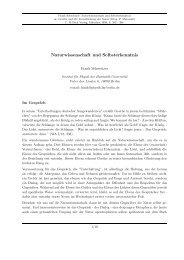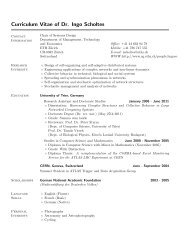Using Laboratory Experiments to Study Law and Crime - Chair of ...
Using Laboratory Experiments to Study Law and Crime - Chair of ...
Using Laboratory Experiments to Study Law and Crime - Chair of ...
Create successful ePaper yourself
Turn your PDF publications into a flip-book with our unique Google optimized e-Paper software.
Southerners who were insulted finished the s<strong>to</strong>ry by describing Larry injuring or threatening <strong>to</strong>injure the man – a higher proportion than among Southerners who were not insulted or amongnortherners.In a second experiment, the researchers looked <strong>to</strong> see whether the insult caused differentphysiological reactions. To do this they measured subjects’ cortisol levels before <strong>and</strong> after theinsult. They found that cortisol levels increased 79% among insulted Southerners (comparedwith 42% for no insult Southerners) <strong>and</strong> increased 33% for insulted Northerners (compared with39% for non-insulted Northerners). These results were statistically significant at the 5 % level.The researchers also measured the extent <strong>to</strong> which the subjects believed that their statuswas lowered in the eyes <strong>of</strong> those who observed the insult. The results showed that Southernerswho were insulted were more likely than Northerners <strong>to</strong> feel that their reputation had beendamaged.Finally, the researchers looked <strong>to</strong> see whether Southerners would behave in a moreaggressive way after being insulted. Subjects were instructed <strong>to</strong> walk down a hall. A confederatewalked from the other end <strong>of</strong> the hall <strong>to</strong>ward the subject. Researchers measured how long thesubject would walk <strong>to</strong>ward the confederate before he stepped aside <strong>and</strong> gave way <strong>to</strong> him. Theresults showed that Southerners who had been insulted walked further before they deferred <strong>to</strong> theconfederate (37 inches from the confederate for those who experienced an insult versus 108inches for those who did not). Northerners behaved no differently whether insulted or not.Insulted Southerners also interacted with others in a more domineering way than those in otherconditions.The labora<strong>to</strong>ry experiments provided evidence <strong>of</strong> mechanisms. They showed that, forSoutherners, insults <strong>to</strong> honor led <strong>to</strong> increased anger, cortisol levels, <strong>and</strong> perceptions <strong>of</strong> reputationdamage. Insults also increased aggressive behavior. One could criticize the experiment. Onemight argue, for example, that Southerners in Michigan are not like Southerners who stay in theSouth. Or, one might argue that behaving aggressively in the labora<strong>to</strong>ry is not the same as13







